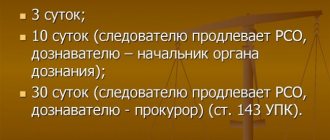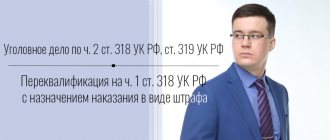Everything about criminal cases
Go to the Appeal Map
Average statistical time for consideration of cases on appeal (in a regional court):
A)
45-90 days, if the case does not “make circles” to the court of first instance and back, there are no problems with notifying the parties.
b)
about 4-5 months in case of difficulties with notifying the parties, restoring procedural deadlines, etc.
— a necessary disclaimer: the date is very approximate, all deadlines are indicated “to the maximum”, in practice everything depends on the characteristics of each individual case: the number of participants, etc.
— the deadlines are given without taking into account the possible situation of missing the appeal deadline
complaints.
In this scenario, related to the restoration of
the appeal period, you can safely add another 30 days.
— note: please note that in some cases it is even beneficial to extend the appeal process longer, you can read about this here: Artificial delay
appeals in order to reduce the sentence.
- it should immediately be noted that the period from the date of commencement of consideration is not limited by time frames (in Chapter 45.1
The Code of Criminal Procedure does not specify this period).
The only rule that contains a time frame is Article 389.10 of the Code of Criminal Procedure
, but it only talks about the time frame within which the appellate court must begin its consideration - but does not say anything about when the review must be completed.
- that is, there are no normative time limits: but there is only a general principle of reasonableness of terms ( 6.1 Code of Criminal Procedure
) and established judicial practice.
The process of moving the case after filing an appeal
| I. Technical verification of the complaint | Technical verification of the complaint (0 - 30 days) - first, the appeal reaches the table of the judge of the first instance (who made the appealed decision), who carries out a technical check (that is, its compliance with the formal requirements of Part 1 389.6 of the Code of Criminal Procedure , whether the complaint is signed, etc.). - if the complaint contains errors, the judge returns the complaint for correction ( Part 4 389.6 of the Code of Criminal Procedure ). Arguments are not verified - the first-instance judge checking the complaint is just a technical employee. He does not make any assessment of the arguments of the complaint. This is not within its competence (but the exclusive right of the court of appeal). He cannot make any significant decisions on the complaint. His only right is if technical errors are found, to return the complaint to the applicant for correction ( Part 4 389.6 of the Code of Criminal Procedure ). Technical return - the only decision that the judge can make is not to make at this stage: return the complaint to eliminate the shortcomings. Note - at this stage you should not expect any “tricks” from the court. If a complaint is returned for correction, the reason is always real errors. The judge will not find fault with little things: grammatical errors, etc. Neither the court nor the prosecution can use the mechanism for returning a complaint (provided for in Part 4 389.6 of the Code of Criminal Procedure ) to deprive the convicted person of the opportunity to appeal (this mechanism is too transparent). |
| II. Notification of participants | Notification of participants (30 – 90 days) "Post" stage - this is the longest stage, during which the court of first instance is obliged to fulfill the requirements of 389.7 of the Code of Criminal Procedure - notify all parties about the complaints and objections brought. - in a criminal case there must be receipts for the delivery of copies of complaints and objections; this is entrusted specifically to the court of first instance, and not to the appellate court. - until receipts (notices of delivery) have been received in the case, the case will not be sent for appeal. - after all, if the appeal reveals the absence of any receipt, then the case will be returned to the district court ( clause 7 Plenum No. 26). For the district court, this return is undesirable (it is considered a defect in the work). - only after making sure that all persons have been notified of the complaints filed, the court sends the case “up” to appeal ( 389.8 Code of Criminal Procedure ). The matter just lies there — until postal notifications notify all persons arrive, the case will be in the first instance court. No time limit — it is this stage of appeal that can sometimes “eat up” a lot of time (even up to 3 months). - this period is not limited by procedural deadlines (except for ideas about “common sense”). Preventive measure — in the period after the verdict and until the decision of the appellate court, the preventive measure remains in force ( clause 57 Plenum No. 41). If the convicted person is in custody, then: - before the case is transferred to appeal, the extension of the period is carried out by the district court ( 255 Code of Criminal Procedure ) — after the case is referred to appeal, the extension of the period is carried out by the court of appeal ( clause 7.1 Plenum No. 26). |
| III. Preparing a case in the court of appeal | Preparing a case in the court of appeal (30 - 45 days) - after the case is received by the court of appeal, it also carries out a technical check ( 389.11 Code of Criminal Procedure ), at this stage the court of appeal double-checks whether all actions were carried out by the court of first instance. - this is also a technical stage, at which the arguments of the complaint are not assessed and procedural decisions are not made (almost not accepted, unlike the stage of technical verification in the first instance, a small list of issues is still resolved, for example, about calling witnesses ). Return Url Additional information: — Part 3 389.11 Code of Criminal Procedure return of the case to the court of first instance to correct shortcomings — clause 7 Plenum No. 26 return of the case to the 1st instance for technical reasons - the absence of any element entails the case being returned “down” ( Part 3 389.11 of the Code of Criminal Procedure ), the appeal will never take on technical issues, all of that is left to the lower court to decide. - the parties are not notified of the fact that the case has been returned to correct shortcomings, — the time frame for correcting shortcomings is procedurally unlimited (except for “common sense” considerations) - after correcting the shortcomings, the terms of Article 389.10 of the Code of Criminal Procedure begin to flow again from the moment the case reaches the appellate court. Deadlines — article 389.10 of the Code of Criminal Procedure provides the appellate court with 15 - 45 days (depending on the level of the court) within which it must meet (from the date of receipt of the case to the date of commencement of consideration of the case in the appeal) Url Additional information: — clause 7 Plenum No. 26 review of the case upon admission to the court of appeal — Having received the case from the district court, the appellate court first checks the technical aspects: whether everything has been done by the district court (notifying the parties, etc.). The list of mandatory verification actions can be found in paragraph 7 Plenum No. 26. Witnesses - only one procedural issue (which we consider really important) is resolved at this stage. This is a question of calling new witnesses ( clause 2, part 1 389.11 ). Judge-Rapporteur - at this stage a new procedural person appears: the judge-reporter . As a rule, that judge. who accepted the case for verification, subsequently actually reads the entire case (unlike the other 2 judges, who are formally equal) and makes a real decision on the complaint. |
| IV. Consideration of the case | Consideration of the case (15 – 45 days) - the period from the date of receipt of the case to the date of commencement of consideration is limited to 15 - 45 days ( 389.10 Code of Criminal Procedure ), — the period from the date of commencement of consideration is not limited by time frame (in Chapter 45.1 The Code of Criminal Procedure does not specify this period). Final stage Url Additional information: - part 3 393 of the Code of Criminal Procedure the court of appeal notifies the pre-trial detention center of the entry into force - when the appellate court makes a decision on the appeal, it sends a special notice to the pre-trial detention center (and the verdict of Part 3 393 of the Code of Criminal Procedure ). This is a signal to the administration of the detention center that the fate of the convicted person has finally been determined and has entered into legal force. Url Additional information: — Part 1 75 PEC sending to the place of serving the sentence no later than 10 days - from this moment the 10-day period begins to run, during which the convicted person must be sent to the place of serving imprisonment ( Part 1 75 of the Penal Code ). |
The question is, what are the consequences of the court violating the deadline for considering the complaint?
— failure to comply with deadlines 389.10 Code of Criminal Procedure
is a violation of rights, namely, this is a restriction of a citizen’s right to timely access to justice and
a reasonable period
of criminal proceedings.
A)
This is a formal violation, easily proven, but has no practical significance for the defense. In theory, such a violation could give rise to rights to compensation for the violation of the right to a reasonable trial, but in practice this is unlikely. That is, it will not be possible to “punish” the court for violating deadlines.
b)
It is necessary to mention such a legal mechanism as filing an application to accelerate the time limit for consideration of the case (
Part 5 6.1 of the Code of Criminal Procedure
).
Reasonableness criteria
- in accordance with Part 3 6.1 of the Code of Criminal Procedure
The criteria for a “reasonable time” for a criminal trial are formulated so generally and abstractly that they can be interpreted in any way (by the court, and not by the defense, of course).
Before the verdict
— it is also worth noting that although the norm is part 1 6.1 of the Code of Criminal Procedure
it is stated that all criminal proceedings must have a reasonable period of time (and criminal
proceedings
are proceedings in all instances, not only in the first), but at the same time, the norm of
Part 3 6.1 of the Code of Criminal Procedure
states that the criteria for the “reasonableness” of the period of the process are applied to the period - until the sentencing. An appeal and cassation are carried out after the verdict is passed, that is, from the wording of this norm it follows that if the process of appeal and cassation is delayed, it will be more difficult to argue the complaint.
Return to Appeal Map
Seek advice
Is it possible to dismiss a criminal case on appeal if the grounds for this arose after the verdict?
It is quite rare, but there are cases when it was not possible to come to an agreement with the victim, compensate for the damage and terminate the case through reconciliation of the parties (Article 25 of the Criminal Code of the Russian Federation) in the court of 1st instance, or only after the verdict there were grounds for terminating the criminal case with the imposition of a court fine ( Article 25.1 of the Criminal Code of the Russian Federation).
What to do? Is there a way out? Is it possible to file an appeal, then make peace with the victim, compensate for the damage, and terminate the criminal case on appeal? In Russia, judicial practice is controversial. For example, in Penza, Karelia and St. Petersburg, courts refuse to dismiss a criminal case on appeal, often pointing out that “compensation for moral damage to the victim after the verdict, which also satisfied the victim’s claims for compensation for moral damage, is a circumstance mitigating the punishment of the convicted person, is not, does not call into question the fairness of the imposed punishment and cannot serve as a basis for terminating a criminal case” or “the fact of compensation for damage caused after the pronouncement of a verdict in a criminal case is not recognized as a basis for canceling the verdict and terminating the case in connection with the reconciliation of the parties.”
At the same time, in Stavropol, Sverdlovsk and Moscow, courts dismiss criminal cases on appeal, citing the fact that Art. 389.21 of the Code of Criminal Procedure does not connect the possibility of termination of a criminal case in the court of appeal with the stage when such grounds arose.
Independent resolution of conflict with the defendant
A systematic analysis of the law says that it is possible to terminate criminal cases on appeal. In particular, part 2 of Art. 20 of the Code of Criminal Procedure directly establishes the possibility of reconciliation of the parties in cases of crimes under Part 1 of Art. 115, art. 116.1, part 1 art. 128.1 of the Criminal Code, in the court of appeal - until the court of appeal withdraws to the deliberation room to make a decision on the case. In addition, according to Part 2 of Art. 25.1 of the Code of Criminal Procedure, termination of a criminal case or criminal prosecution in connection with the imposition of a criminal law measure in the form of a judicial fine is allowed at any time during the criminal proceedings, including in the appellate court - until the appellate court retires to the deliberation room for a decision decisions on the case.
In connection with the above, the second approach is more logical, does not contradict the law, is fair, meets the goals of humanizing the criminal sphere, reducing the number of convicted citizens of the country, and respects the right of the victim to independently resolve the conflict with the defendant. And it simply corresponds to one of the most important legal approaches: “Everything that is not prohibited is permitted.”
Therefore, even if you are not one of the happy residents of the capital, you still try to stop criminal cases on appeal, and if refused, continue to write complaints all the way to the Supreme Court of Russia. You have a good chance of success and termination of the criminal case.
I provide every second Principal/Client with services to terminate simple criminal cases free of charge, with payment based on the result after the termination of the criminal case! I work all over Russia, attract local lawyers, whose work I control and am responsible for the quality of legal assistance! I can also conduct a case remotely: I advise, teach how to behave in court over the phone, prepare draft documents for filing in court and terminating a criminal case.
complaint (appeal) under Article 125 of the Code of Criminal Procedure of the Russian Federation
To the Judicial Collegium for Criminal Cases of the Moscow City Court
Applicant: Lawyer S.V. Chernov, in the interests of client XXXXX
Interested person: Investigator for the Department of Internal Affairs of the SCh for the OPD of the Internal Affairs Directorate for the Eastern Administrative District of the Main Directorate of the Ministry of Internal Affairs of Russia for Moscow XXXXX
Appeal against the decision of the Izmailovsky Court
In the Izmailovsky District Court of Moscow in accordance with Art. 125 of the Code of Criminal Procedure of the Russian Federation, a complaint was filed to recognize the Resolution of the investigator of the Investigative Directorate of the Investigative Directorate of the Internal Affairs Directorate of the VAO Main Directorate of the Ministry of Internal Affairs of Russia for Moscow XXXXXXXXX dated February 22, 2019 on the drawing up of an indictment in criminal case No. XXXXXXX, initiated on March 1, 2022 on the grounds of a crime under Part 4 Art. 159 of the Criminal Code of the Russian Federation and sending it for approval to the head of the investigative body, illegal and unfounded. The court, by its Resolution, refused to accept the complaint for proceedings, citing the fact that an allegedly similar complaint was satisfied by the deputy head of the Internal Affairs Directorate for the Eastern Administrative District - the head of the IC, who issued a decision to return the criminal case for additional investigation in connection with the identified violations, in connection with which it was established the investigation period is one month from the date the case was received by the investigator and, accordingly, there is no subject of appeal. In fact, this decision of the investigator was not appealed to either the prosecutor or the head of the investigative body in accordance with Article 124 of the Code of Criminal Procedure of the Russian Federation. Accordingly, the Court, in violation of the Resolution of the Plenum of the Supreme Court of the Russian Federation dated February 10, 2009 No. 1 “On the practice of courts considering complaints in accordance with Art. 125 of the Code of Criminal Procedure of the Russian Federation”, issued the appealed resolution in the course of preparation for the court hearing with the motivation for the cancellation of the appealed resolution dated January 19, 2019 by the head of the IC.
By this Resolution, the Court is in violation of Article 8 of the Universal Declaration of Human Rights, paragraph 1 of Article 14 of the International Covenant on Civil and Political Rights, paragraph 1 of Article 6 of the Convention for the Protection of Human Rights and Fundamental Freedoms) and paragraph 3 of Article 123 of the Constitution of the Russian Federation and Articles 15-16 of the Code of Criminal Procedure RF, did not provide the Complainant with the right to judicial protection on the basis of a fair trial, which implies ensuring adversarial rights and equality of the parties, including the provision of sufficient procedural powers to protect their interests in the implementation of all procedural actions.
The basis for filing a complaint in accordance with Article 125 of the Code of Criminal Procedure of the Russian Federation was the illegal actions of the investigator, who, in order to extend the period of preliminary investigation in a criminal case beyond 12 months, bypassing the law provided for in Part 5 of Article 162 of the Code of Criminal Procedure of the Russian Federation, sent the above Resolution to the head of the Investigative Unit Investigation in accordance with Part 6 of Article 162 of the Code of Criminal Procedure of the Russian Federation. In the Resolution, the investigator indicated false information about the alleged failure of the accused to appear within the established time frame to familiarize themselves with the materials of the criminal case in accordance with Articles 215-217 of the Code of Criminal Procedure of the Russian Federation. At the same time, the applicant of the complaint was not invited by any summons or telephone message to participate in this investigative action.
The applicant came to the VAO Department every day, presented his passport to the security officer at the checkpoint, and personal information was entered into the log. I believe that the investigator committed this abuse, since the extension of the investigation period beyond 12 months in accordance with paragraph 5 of Article 162 of the Code of Criminal Procedure of the Russian Federation by the head of the Investigation Department of the Ministry of Internal Affairs of the Russian Federation is allowed when investigating a criminal case that is particularly complex. And in this case, no investigative actions were taken with the accused for more than five months. The fact that these actions of the investigator are an abuse of the Law is also evidenced by the assessment of the norm of paragraph 6 of Article 162 of the Code of Criminal Procedure of the Russian Federation by the Constitutional Court of the Russian Federation in its Determinations of July 2, 2015 No. 1541-O, 1542-O and No. 1543-O. There is no evidence of the defendant’s failure to appear to familiarize himself with the case, other than the unfounded statements of the investigator. Significant violations of the rights of the accused continue throughout the entire period of the preliminary investigation: the investigator never once violated paragraph 8 of Article 162 of the Code of Criminal Procedure of the Russian Federation and the positions of the Constitutional Court of the Russian Federation set out in the Determinations of December 18, 2003 No. 429-O and of April 16, 2009 No. 386-O not only did not provide the opportunity to become familiar with the decisions on the progress of the criminal case, but did not even notify either the applicant of the complaint or the defense attorneys. All of these violations are significant and deprive not only the accused, but also other participants in the process from enjoying their procedural rights. According to paragraph 1 of Art. 389.17 of the Code of Criminal Procedure of the Russian Federation “The grounds for canceling or changing a court decision by a court of appeal are significant violations of the criminal procedural law, which, by depriving or limiting the rights of participants in criminal proceedings guaranteed by this Code, non-compliance with the judicial procedure, or in any other way, influenced or could influence the issuance of a lawful and justified judicial solutions". Taking into account the above, guided by Articles 389.1-389.15 of the Code of Criminal Procedure of the Russian Federation, I ask
.Cancel the Resolution of the Izmailovsky District Court of Moscow dated February 30, 2022, satisfying the applicant’s complaint in the criminal case.
S.V. Chernov
Article 327.2 of the Code of Civil Procedure of the Russian Federation. Time limits for consideration of a case in an appellate court (current version)
1. Establishing at the legislative level the terms for consideration of cases in the court of appeal is a guarantee of respecting the right to have a case considered by the court within a reasonable time, preventing delays in the trial and red tape in civil proceedings. The provisions of the commented article determine the various terms for consideration of cases by appellate courts, based, firstly, on the level of the appellate court in the system of courts of general jurisdiction, and secondly, on the special legal regulation of certain categories of civil cases.
The first of these criteria is reflected in parts 1 and 2 of the commented article, which differentiates the terms for consideration of a case on appeal by district courts, supreme courts of republics, regional, regional courts, courts of federal cities, courts of an autonomous region, courts of autonomous districts, district (naval) military courts, the Supreme Court of the Russian Federation. The general rule for all courts of general jurisdiction exercising the powers of appellate consideration of civil cases, with the exception of the Supreme Court of the Russian Federation, is a two-month period for consideration of the case. For the Supreme Court of the Russian Federation, the legislator increased this period by another month, establishing the possibility of considering cases by the Judicial Collegium for Civil Cases of the Supreme Court of the Russian Federation, as well as by the Appellate Collegium of the Supreme Court of the Russian Federation, within three months. The starting point when calculating the deadlines set out in the commented norms is the day the case is received with an appeal or presentation to the appropriate appellate court.
An important point when calculating the time limits for consideration of cases by the court of appeal, which the Plenum of the Supreme Court of the Russian Federation focuses on in paragraph 19 of Resolution No. 13 of June 19, 2012, is the situation when the court of the first or appellate instance receives an appeal, presentation, and a previously received appeal or presentation has already been accepted for proceedings by the appellate court. In this case, the appellate court, if it has information about the receipt of other appeals and presentations, is forced to postpone the hearing of the case and, if necessary, carry out procedural actions provided for in Art. Art. 323 - 325 of the Code of Civil Procedure of the Russian Federation, return the case to the court of first instance, for which an appropriate ruling is made. Postponement of the trial of the case and its return to the court of first instance is the reason for calculating the time limits established by the commented article not from the date of initial receipt of the appeal or presentation by the court, but from the date of receipt of the case with the last appeal or presentation by the court of appeal. At the same time, in order to comply with reasonable deadlines for legal proceedings, the appellate court, when postponing the trial of a case, has the right not to send it to the court of first instance if it establishes that a newly received appeal or presentation was filed within the prescribed period (for example, the appeal was sent by mail and entered the court after the expiration of the appeal period) and meet all the requirements of Art. 322 of the Code of Civil Procedure of the Russian Federation (see commentary to it).
The time limits for consideration of appeals and submissions established by the norms under comment include the time limits for preparing the case for trial and the adoption of a judicial act. The Plenum of the Supreme Court of the Russian Federation, in its Resolution No. 13 of June 19, 2012, draws the attention of the appellate courts to the fact that, regardless of the transition of the appellate court to considering the case according to the rules of a “full” appeal, the period for consideration of the case by the appellate court does not increase, the courts must meet the deadlines established by the legislator in order to respect the right of everyone to have their case considered within a reasonable time. The time period for consideration of the case in the appellate court cannot be extended.
However, based on the analysis of judicial practice, it should be noted that, despite the time limits for consideration of cases in the appellate court clearly stated in the commented article, in practice there are still cases of exceeding the established time limits for consideration, including those that are not justified in any way.
Example: The Moscow City Court recognized that the length of the trial was largely due to the ineffective and insufficient actions of the court in resolving the dispute that arose between the parties and, above all, the actions of the appellate court. As follows from the case materials, the appeal was filed on October 15, 2013, and the appeal ruling on it was adopted on July 8, 2014. From the case materials it is clear that there are no objective reasons why the applicant’s appeal could be scheduled for consideration for so long (only after 9 months), not available. In view of this, the court came to the conclusion that during the specified periods of time the actions of the court to consider the applicant’s case were insufficient and ineffective, which did not allow ensuring the legally guaranteed right to a trial within a reasonable time (see the decision of the Moscow City Court of April 20, 2015 in the case N 3-0227/2015).
2. Based on the position of the legislator, set out in part 3 of the commented article, the time frame for consideration of the case in the court of appeal may differ from those established in the previous provisions of parts 1, 2 of the norm in question, due to the fact that federal laws, including the commented codified normative act, other deadlines for consideration of certain categories of cases in the appellate court may be established. The legislator in the commented norm draws the attention of the law enforcement officer to the fact that such deadlines can only be established by the federal legislator. This position is based on the provisions of paragraph “o” of Art. 71 of the Constitution of the Russian Federation, which relates procedural legislation to the jurisdiction of the Russian Federation.
Currently, the only exception to the general rule regarding the time limits for consideration of cases by the appellate court are the provisions of Part 2 of Art. 244.17 of the Code of Civil Procedure of the Russian Federation, which reduce the period for consideration of a case received on appeal, presentation of a case on the return of a child or on the exercise of rights of access to one month from the date of its receipt by the court of appeal. Other deadlines for consideration of cases on appeal, different from those enshrined in the commented article, are not established by the normative act under consideration and other federal laws.
Shortened deadlines for consideration of appeals and submissions are provided for by federal laws in cases of violation of electoral rights and the right to participate in a referendum of citizens of the Russian Federation, etc. However, at present, in connection with the entry into force of the CAS of the Russian Federation on September 15, 2015, such deadlines are important when considering cases in administrative proceedings. In addition, shortened terms for consideration of cases by the court of appeal are also used in the arbitration process, in particular when considering appeals against a ruling on transferring a case to another arbitration court, a ruling on the return of a statement of claim (statement) and rulings completing proceedings (on termination of proceedings in the case of leaving the statement of claim (application) without consideration (clause 8 of the Resolution of the Plenum of the Supreme Arbitration Court of the Russian Federation of December 25, 2013 No. 99 “On procedural deadlines”).
Comment source:
“COMMENTARY TO CHAPTER 39 “PROCEDINGS IN THE COURT OF APPEALS” OF THE CIVIL PROCEDURE CODE OF THE RUSSIAN FEDERATION OF NOVEMBER 14, 2002 No. 138-FZ”
N.V. Laskina, 2017








